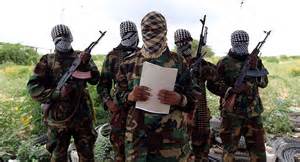By Ashley Repp
News Desk Reporter, Africa
Mogadishu, KENYA- Al-Shabab grapples with the death of leader killed this week by a US strike, reveals new leader, and contends with revenge

In a missile operation on September 1st, carried out by the United States, the leader of al-Shabab, Ahmed Godane, was killed along with two other al-Shabab members. The United States has targeted Godane since 2012, offering a reward for information regarding his whereabouts that would lead to his subsequent death or capture. The Islamic militant group, rooted in Somalia, confirmed the news and announced that there would be repercussions for Godane’s death, and that it is the duty of the al-Shabab organization to avenge the death of the fallen militant leader. Along with this statement, the group also asserted that the enemies of al-Shabab should expect to be caused “great distress.”
In stark contrast to the al-Shabab announcement, the Pentagon acknowledged the death of Godane as significant and politically symbolic. Godane played a key role in increasing the attention given to the militant group by carrying out significant attacks, including the Westgate Mall attack in Kenya last year and the bombing during the 2010 World Cup that took the lives of over 70 people.
Indeed, Godane’s involvement and leadership within the group elevated the notoriety of al-Shabab. He rose to power in 2008 after the death of his predecessor; once in this role, he strengthened ties with the Al-Queda organization and declared allegiance to the group. Godane expanded the breadth of the organization’s influence and began to plan attacks with targets outside of Somalia. Such a rebranding has incited fear, and caused international political leaders to pause and asses how to best manage the risk posed by the militants.
In the wake of Godane’s death, the Somalian government has intercepted information that al-Shabab may be planning retaliatory attacks that will specifically cause the distress that the group has warned will be next. The information reveals that the attacks are likely to target civilians, including hospitals and educational facilities. The Somalian government has put the country on alert and has increased security forces in response to the information. In an attempt to diffuse the potential backlash to follow in the wake of Godane’s death, the Somalian president has offered political amnesty for al-Shabab members that leave within a 45 day grace period.
While al-Shabab has named Godane’s successor, Sheikh Ahmad Umar Abu Ubaidah, it remains unclear what step will be next for the group. And as retaliatory action for the death of Godane has been at the forefront of possibilities, it is likely that tensions will remain high in the region.
For more information, please visit:
BBC News- Al-Shabab Names New Leader After Godane Death in US Strike- 6 Sept, 2014
Rueters- Somalia’s al-Shabaab confirm leader killed by US airstrike, name new head- 6 Sept, 2014
Aljazeera- Somalia’s al-Shabab names new leader- 6 Sept, 2014
Business Week- Al-Shabaab seeks successor to US-killed leader- 6 Sept, 2014